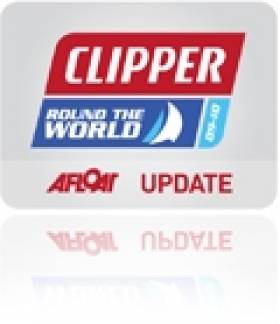Displaying items by tag: UK's City of Culture
Derry is Stopover Port for 2011-12 Clipper Round the World Race
The UK's City of Culture 2013, Derry, has today announced it is to become part of the Clipper 11-12 Round the World Yacht Race with an official city boat in the race. In addition the city will be an official host port, welcoming the ten-strong fleet in July 2012 with a showcase festival at the end of the final transatlantic stage of the 40,000-mile race en route to the race finish.
It will be the first time that Northern Ireland has been represented in the race which attracts a global audience of more than 460 million people.
The potential for the 11-12 entry was developed by Derry City Council with the support of Londonderry Port and Ocean Event Management. It will form an integral part of the campaign to market the city's culture, business and education offerings in a number of the cities on the Clipper 11-12 route. The development of the tourism and international potential for the race and festival has been supported by the Northern Ireland Tourist Board.
The yacht will be one of ten identical 68-foot ocean racing yachts, each of which is sponsored by a city, region or country to carry their name around the world. Joining the Derry entry will be Uniquely Singapore and the Chinese entry, Qingdao, for whom hosting the Clipper Race was a key step in securing the rights to host the sailing events of the Beijing 2008 Olympic Games. Both sponsors have discovered that the Clipper Race provides a unique platform for delivering global market exposure at local market values.
Derry has a long and illustrious maritime history and a key factor in the city's participation in the race will be to generate cultural and socially inclusive legacy projects for the future.
Mayor Councillor Colum Eastwood, speaking at the launch, said, "We've partnered with Clipper as we believe it provides a world class opportunity to showcase the city internationally while supporting business, education and cultural links ahead of the UK City of Culture 2013. It's an important building block in developing the city's reputation as a location for international events and brings fully into the use the full urban quayside of the River Foyle. This is the catalyst project that will bring together public, private, education, sports and community interests to build a legacy for the maritime, tourism, business and cultural interests of the city."
On board the yacht will be a team of people from all walks of life, many of whom who have never sailed before, who are taking on the challenge of a lifetime. Among them will be crew from a number of other countries but it is hoped that the men and women of Derry will also be inspired to get on board and represent their city on a global stage.
In addition to those people with a thirst for adventure who will race around the world representing the city there are opportunities for local businesses to be part of the event. Teams in previous Clipper Races have helped galvanise the community spirit in their sponsoring city, generating a huge sense of ownership and pride in their achievement.
The Clipper Race was set up by Sir Robin Knox-Johnston, the first man to sail solo, non-stop around the world, in order to give ordinary people the chance to do something truly extraordinary.
Sir Robin says, "We are delighted to welcome on board the UK's first City of Culture, Derry, as a yacht sponsor and host port for the Clipper 11-12 Race. The race offers a unique platform to showcase the city around the world, both for business and tourism. We hope that, as other cities and countries have discovered, participation in the race will enable you to build a unique legacy for the city that will last for years to come.
"We hope people from Derry~Londonderry and across Northern Ireland will sign up to take part in the race and that everyone in the city and, indeed, across the country will get behind the team and support them all the way around the world."
Berths are available for people from Derry~Londonderry to compete in the Clipper 11-12 Round the World Yacht Race and there will be public presentations in the city on 20 and 21 September at City Hotel, Derry.
























































